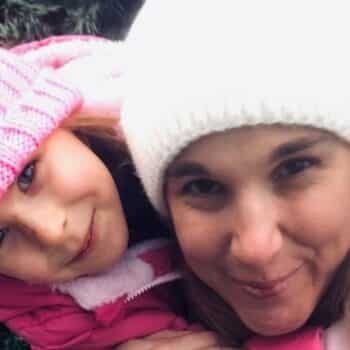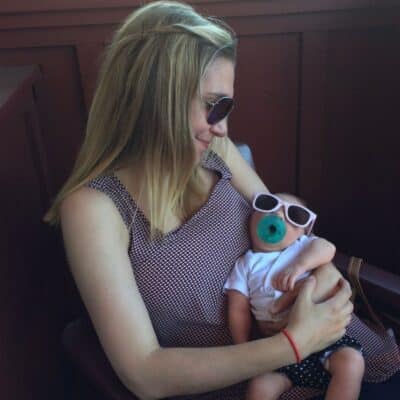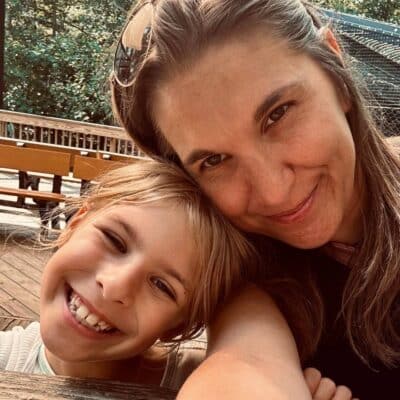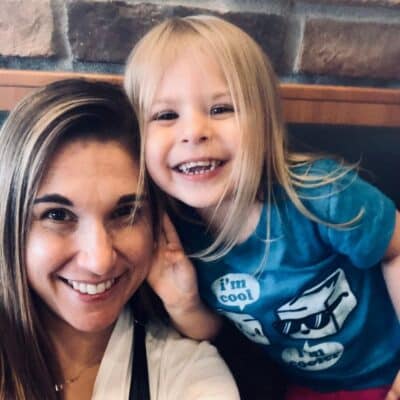Finding Strength in Caregiving

I was thirty when his symptoms suddenly and unexpectedly began, and we were both thirty-six when he finally received his dementia diagnosis.
November 18, 2024
Kristen Medica is a caregiver to her husband who began showing signs of dementia at age 30. She works in healthcare and is a mother to a young daughter.
I quickly lost track of the number of times someone said to me, “You’re so strong”, when they heard our story.
I was never surprised by what they said, and I probably would have said something similar if our roles were reversed. But they weren’t, and I was on the receiving end of their sympathy.
Sometimes I just smiled, not really knowing how best to respond, but most often I replied, “You would do the same if it was you.”
The truth was, for many years I didn’t see myself as strong. I was simply supporting the person I loved and caring for his changing needs. I was also standing by the vows I made: In sickness and in health, right?
Like many other women in their 30s, I was a newlywed and a mother to a young daughter. But unlike most, I had taken on a role as a caregiver to my husband with young-onset dementia.
I was thirty when his symptoms suddenly and unexpectedly began a month before our wedding, and we were both thirty-six when he finally received his dementia diagnosis.

“Major Frontotemporal Neurocognitive Disorder,” is what the diagnosing doctor, the fourth or fifth neuropsychologist that we had seen over the course of six years, called it.
She explained how his progression of physical symptoms, cognitive decline, and behavioral changes aligned with other diseases, that it was difficult to diagnose precisely, and that neuroimaging and blood tests don’t always provide the answers, especially in an atypical case like his. Atypical meant it was rare because he was much younger than the average age of those diagnosed with young-onset dementia.
With a diagnosis, finally, I felt such a huge sense of relief that only other spouses, caregivers, and family members can understand. She not only acknowledged the depth of his mounting struggles, but our concerns were validated. And more than anything, we finally had an answer.
For so many years I had seen all my husband’s symptoms and unexplainable changes with my own eyes. They couldn’t be explained through test results, so they were typically dismissed as stress, anxiety, depression. But they shouldn’t have been.
Almost immediately after he was diagnosed, I joined a few of the online spouse and caregiver groups. Multiple times a day, I found myself drawn to these groups, trying to better understand my husband’s struggles nearly as much as my own. I felt an indescribable connection to my new peers. They got it. They knew what it felt like to fight for answers, sacrifice all your plans and dreams, and lose sight of who you used to be before the endless battles with chronic disease.

They also knew all too well what it was like to lose a husband, even if he was still physically here, which no one else could really understand.
I had such empathy for them, especially the ones who, like me, were younger than most whose loved ones develop dementia. They were just like me: men and women in their 30s and 40s, many raising children while also holding down jobs, managing the house, and caring for their husbands or wives. I admired their strength. I saw their resilience. They helped me feel less alone, even if we were all separately facing our challenging situations in our own homes.
By hearing their stories, I came to better understand my own. They helped me see that this journey was also about me, my needs, and how much it changed me and my life; that it wasn’t selfish to admit that, and in fact, it was necessary. I think that’s when everything changed for me — when I saw that my needs still mattered too.
People said I was strong, but I finally started to believe it and see what strength really looked like within me. I started to recognize that strength was facing this journey head-on in all of my roles: as a wife, mother, caregiver, advocate, and young woman whose life was being changed by a disease that not many know about, let alone properly understand.

I came to admire the strength that it took to advocate and care for my family, while doctors, family, and friends were dismissive and disappeared when we needed their support the most. And maybe most importantly, I learned that there is strength in tears, fears, frustration, and loneliness. It is taking as many deep breaths that you need to, screaming or crying in your car just to get it out, and begging God for something to change because you just don’t know if you can do it anymore.
Strength is admitting that this is the hardest thing I have ever gone through in my life, but still getting up each morning to face each day, and all of its unknowns.